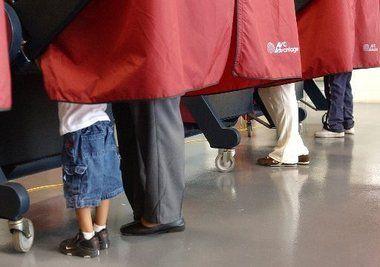According to the 2016 report released by Center for Information and Research on Civic Learning and Engagement (CIRCLE), measuring which states’ young voters have the most significant impact on election results, Louisiana is not among the top 10 for any of this year’s presidential, senate or house races.
Scores are based on the Youth Electoral Significance Index, which measures factors such as past young voter behavior and involvement, state-specific laws, race, college education and poverty rates.
Iowa ranked first for the 2016 presidential election, followed by New Hampshire and Pennsylvania.
According to the most recent update from the Louisiana Secretary of State’s Office, about 800,000 people ages 18 to 34 across the state of Louisiana are registered to vote.
Though there are approximately 300,000 college-aged students in Louisiana, marketing sophomore and Geaux Vote LSU vice president Maddie Melancon said 80,000 aged 18 to 20 are registered voters.
College-aged voter turnout in Louisiana has been 30 percent in the past two non-presidential elections, compared to the state’s overall average of 45 percent, according to the Louisiana Secretary of State’s Office.
Across all age groups, Melancon said 81 percent of eligible Louisiana citizens are registered voters, one of the highest rates in the United States.
Voter turnout has remained low among all college-aged students across the country, according to a 2014 CIRCLE report that urged change of this persistent trend for 2016.
Accounting junior Jasen Aidt registered to vote in Louisiana when he was 18. He said he cares about voting, having voted for the president of his parish and the House representative.
Aidt said he plans on voting IN the primaries for the 2016 presidential election and is “pretty sure” he knows who he will vote for.
“Even if you don’t have an appeal to all of them, you’ve got to have something you like in one of them,” Aidt said.
As a single voter, Aidt said he thinks he has an effect on the 2016 presidential election. He said if one person votes one way and another person votes the other way, those votes “cancel out.” However, if one person does not vote at all, the opposing vote prevails.
History and English junior Jordan Welch said he registered to vote when he turned 18 because his parents recommended it.
While he said he plans on voting, Welch said he had an easier time picking out a candidate when he voted in the 2012 presidential election. He said he has been following the Republican debates because they are “more interesting.”
“This is the most controversial and most important election,” he said. “It’ll be interesting, to say the least.”
Through Geaux Vote LSU, Melancon said she has seen many students leaning liberal for the upcoming election. There is a split, she said, between former Secretary of State Hillary Clinton and Sanders, but recently she finds more people leaning toward Sen. Bernie Sanders. Candidate preferences on the conservative side are “spread all over”.
Melancon said college-aged voter turnout is low for two reasons: many students think their vote will not matter and many register in their hometown. Requesting an absentee ballot, she said, can be a lot of work, and not everyone remembers to go home to vote on election day.
Melancon said she encourages eligible students to register to vote with their Baton Rouge address because people are more likely to vote if they are close to their polling place.
Because college students are “just getting into the world,” she said they sometimes don’t care about politics.
“I think that as students start to become affected as they get older, such as having to start paying taxes, or in our case now, higher education budget issues, they will be ready to start getting involved more,” Melancon said.
Political communication professor Martin Johnson studies Louisiana campaigns and elections. He said the older people get, the more likely they are to vote.
He said Louisiana has fairly stable Republican outcomes and students tend to trend Democratic, which makes it hard for them to influence elections.
While younger voters and the college student population probably contribute to the democratic blueness in purple Baton Rouge, Johnson said, as a college town, the city is especially conservative. The University’s student population, however, is diverse in a partisan sense.
He said Louisiana college-aged Republicans will mimic the rest of the state’s Republican population. Voters may swing toward Sen. Marco Rubio because he is young, but they also like Donald Trump and Sen. Ted Cruz. For whatever reason, Johnson said, Trump attracts an age-diverse crowd.
Johnson also called this presidential campaign unique, especially for young voters participating for the first time.
“If it were to come to pass that Donald Trump and Bernie Sanders are the nominees for the two major parties, that is a potential and completely antithetical outcome to how we think presidential politics should work,” Johnson said. “It’s wild.”
Young Louisiana voters lack significant impact in 2016 presidential race
By Sarah Gamard
February 28, 2016

Voting
More to Discover







